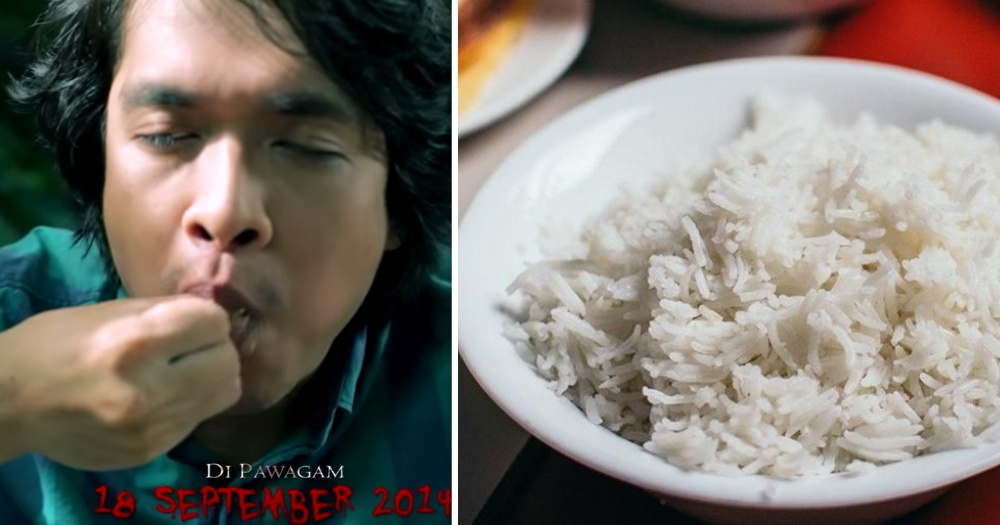You might have read about an Indonesian domestic worker who mixed her urine, saliva, and menstrual blood into rice that she then served her employers.
She hoped that by doing so, the family would treat her better.
So why do some believe that mixing bodily fluids into food improve relationships? The answer lies in nasi kangkang.
What is nasi kangkang?
Nasi kangkang (also known as nasi tangas) literally translates to "squat rice".
Very apt.
According to folklore, it is a black magic love potion created by bomohs (Malay witch doctors).
The stories often involve a woman, usually a scorned wife, cooking a pot of rice for her husband. After that, she will squat over the steaming bowl - bottom naked - and let her sweat, fluids, and condensate drip down into the rice.
Finally, she stirs it vigorously and serves it to her unsuspecting husband.
In some cases, the woman would be instructed by the bomoh to add other 'ingredients' into the mix, like fingernails or faecal matter.
When the target eats the nasi kangkang, he is thought to be under the woman's control and can never leave her.
Forbidden in Islam
Nasi kangkang operates on the black magic concept that feeding impure substances to the victim subjugates them to the spellcaster's whims.
However, most Muslims agree that Islam forbids the use of black magic or sorcery to manipulate relationships.
In fact, it was interpreted in the Quran that those who practise sorcery are condemned in the afterlife:
"...And indeed they knew that the buyers of it (magic) would have no share in the Hereafter..."
Additionally, the Quran also has a chapter called Al-Falaq, or "The Daybreak", which is often recited to protect one from evil.
On the big screen
The dish has also stirred up the creative juices of many, including Malaysian film director Hashim Rejab.
Titled Nasi Tangas (Nasi Kangkang), the stomach-turning dish made for a stomach-turning film, as the horror movie showed some truly revolting consequences of witchcraft.
First shown in Malaysian cinemas in 2014, the PG13 film follows a jealous wife, Mira, as she tries to wrest her husband's attention away from his childhood friend Fatin.
Inspired by her own mother's dabbles in witchcraft, Mira resorts to cooking nasi kangkang for her husband to make him captive to her wishes, just as her mother did.
As the story unfolds, the vulgarity and evil ramps up as spiritual forces come to terrorise the lives of all parties involved in black magic.
You can check out a review here.
If you feel compelled to watch it here's a link.
Closer to home, local horror drama series "Avenue 14" also explored the idea of nasi kangkang in one of their episodes.
Head writer Shermin Toh told Mothership about some aspects of horror she felt Nasi Kangkang evoked.
"I feel the idea of blood and bodily fluids mixed into the food you consume is scary, but what's more horrifying is the idea of being manipulated and essentially being coerced into doing something against your will.
It's also scary because the food would most likely come from someone you trusted. So it's many layers. The thought of eating something unsanitary, the betrayal of trust from the person giving you the food, and then being coerced into doing something against your will."
Not just a regional thing
This particular method, or at least aspects of it, of seeking love isn't exclusive to our region either.
In fact, "sweat rice" is a thing that is practised similarly in the Carribean country of Trinidad.
Apparently, there was also something called the "love cake" from medieval times where one would bake a cake whilst naked. And that's not all: They would rub the dough onto their body to absorb their sweat.
The cake would then be served to the victim, in hopes of making the victim fall in love with the one who baked the cake.
Don't do it
If it was not already obvious, tainting food with bodily excretions is a big no-no.
The aforementioned domestic worker pleaded guilty to two counts of mischief and one count of theft.
The employers were not enamoured.
Image by Mamoru Masumoto from Pixabay and YouTube
Content that keeps Mothership.sg going
??
You get an angpao, you get an angpao, everyone gets to win an angpao!
??
$1.50 unagi sushi?!? Don't say we bojio.
??
Technology can be scary for older folks, but it doesn’t have to be.
If you like what you read, follow us on Facebook, Instagram, Twitter and Telegram to get the latest updates.
